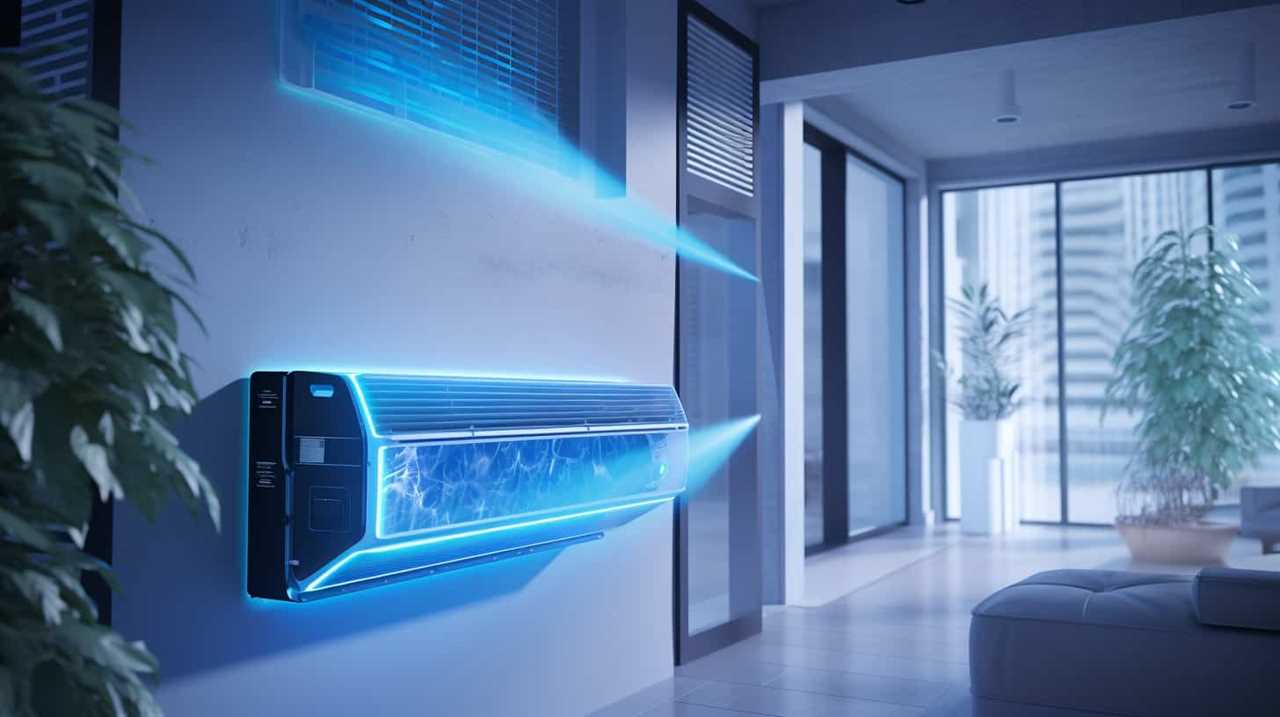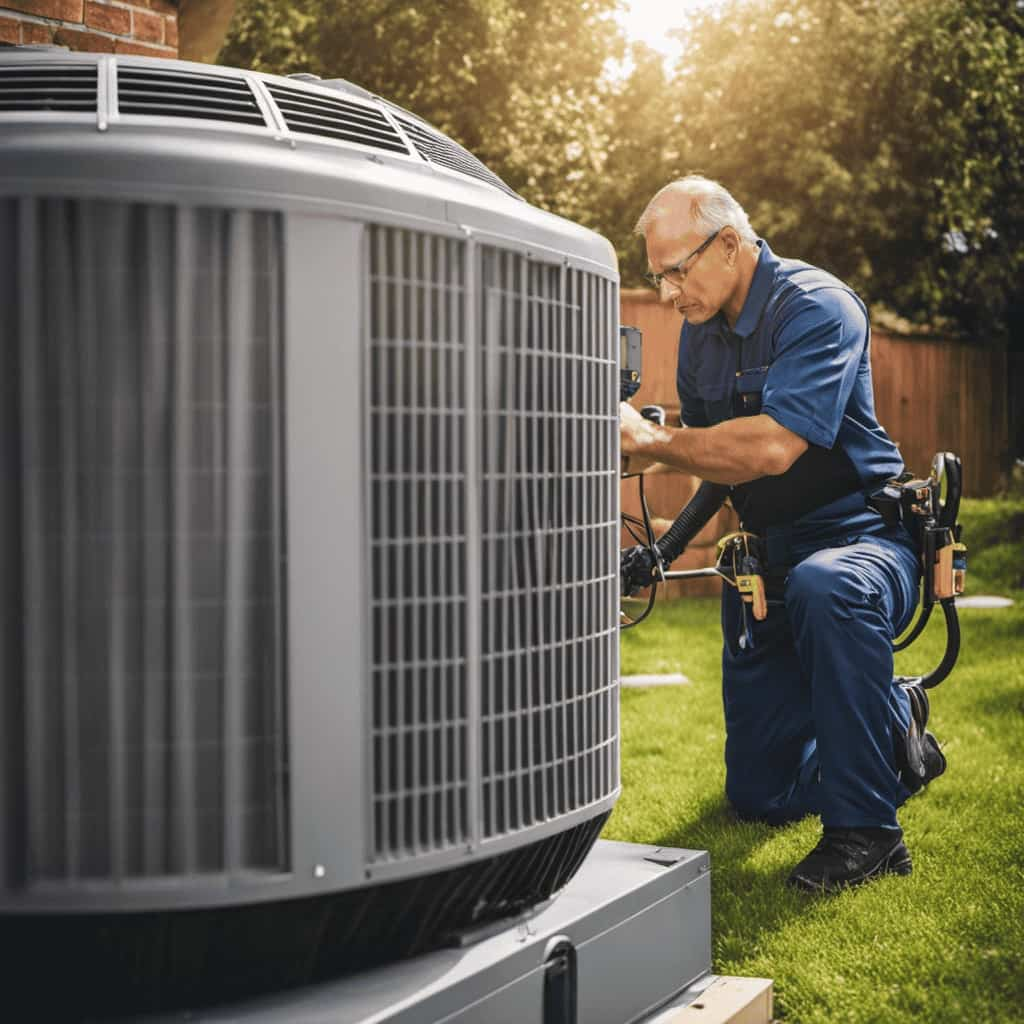
Tired of high energy bills and inefficient heating systems? Look no further! We have the ideal solution for you.
In this article, we’ll show you how to achieve energy-efficient home heating with heat pumps. These innovative devices use a combination of electricity and natural heat sources to keep your home warm and cozy all winter long.
Say goodbye to cold drafts and hello to lower energy costs. Let’s dive in and start saving money while serving the environment!
Key Takeaways
- Proper sizing of the heat pump is crucial to ensure optimal energy efficiency and performance.
- Regular maintenance and cleaning of the heat pump are essential for maximizing efficiency.
- Insulation and weatherstripping play a significant role in reducing heat loss and improving energy efficiency.
- Taking advantage of energy-saving features and technology, such as programmable thermostats, can help achieve energy-efficient home heating with heat pumps.
Understanding the Basics of Heat Pumps
Now that we’ve covered the importance of energy-efficient home heating, let’s delve into the basics of heat pumps.
Heat pump efficiency is a crucial factor to consider when it comes to choosing a heating system for your home. Heat pumps work by transferring heat from one place to another using refrigerant. They have the ability to both heat and cool your home, making them a versatile option.
The operation of heat pumps involves extracting heat from the outside air or ground and transferring it indoors. This process is achieved through the use of a compressor, evaporator, condenser, and expansion valve.
Choosing the Right Size Heat Pump for Your Home
We should evaluate our home’s heating needs and select the appropriate size heat pump. Choosing the right size heat pump for your home is crucial for optimal heat pump efficiency and performance.
If the heat pump is too small, it will struggle to meet the heating demands of your home, resulting in increased energy consumption and reduced comfort. On the other hand, if the heat pump is too large, it will cycle on and off frequently, leading to inefficient operation and unnecessary wear and tear.
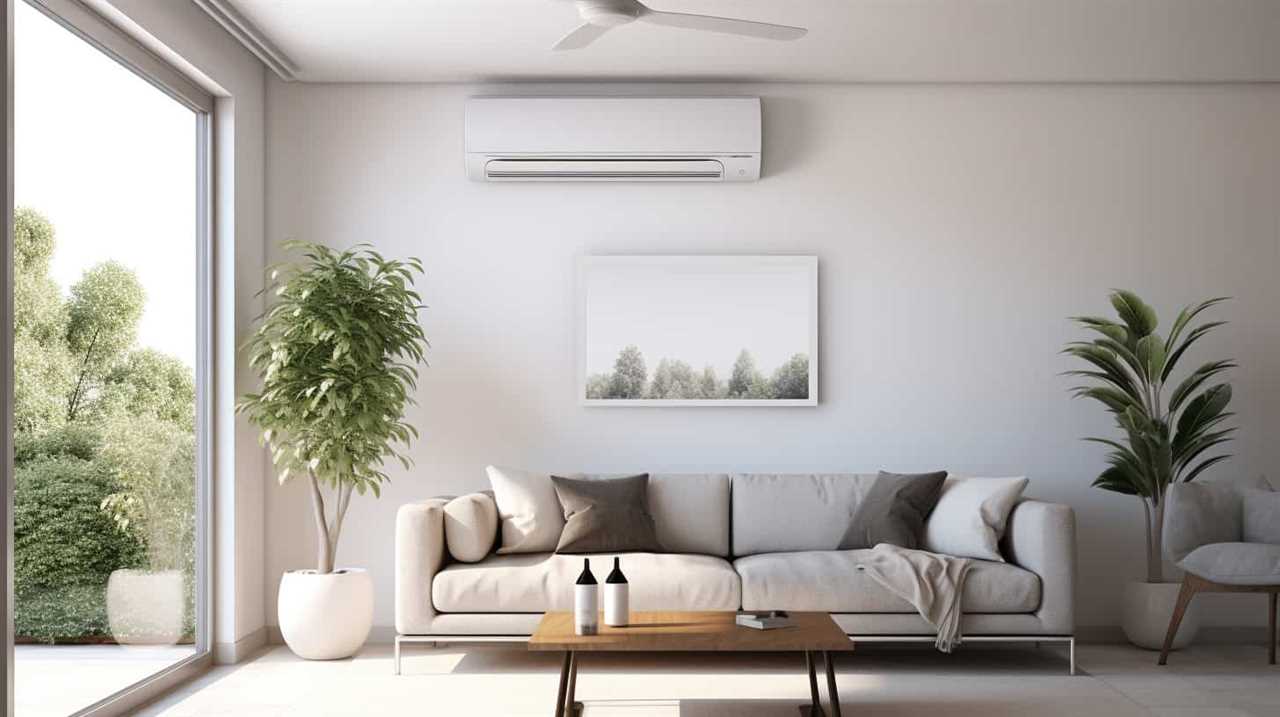
To determine the correct heat pump sizing, factors such as the size and layout of your home, insulation levels, climate, and desired indoor temperature should be considered.
A professional HVAC contractor can perform a heat load calculation to accurately determine the appropriate size heat pump for your specific needs.
Installing a Heat Pump: Professional Vs. DIY
For most homeowners, it’s recommended to hire a professional to install a heat pump rather than attempting a DIY installation. Installing a heat pump involves complex electrical and refrigeration work that requires specialized knowledge and skills. Professional installation ensures that the heat pump is properly sized, installed, and calibrated for optimal performance and efficiency.
It also helps to avoid common DIY challenges such as incorrect wiring, refrigerant leaks, or improper placement, which can lead to system malfunctions, reduced energy efficiency, and costly repairs. By opting for professional installation, homeowners can have peace of mind knowing that their heat pump will be installed correctly and will deliver reliable and energy-efficient heating for years to come.
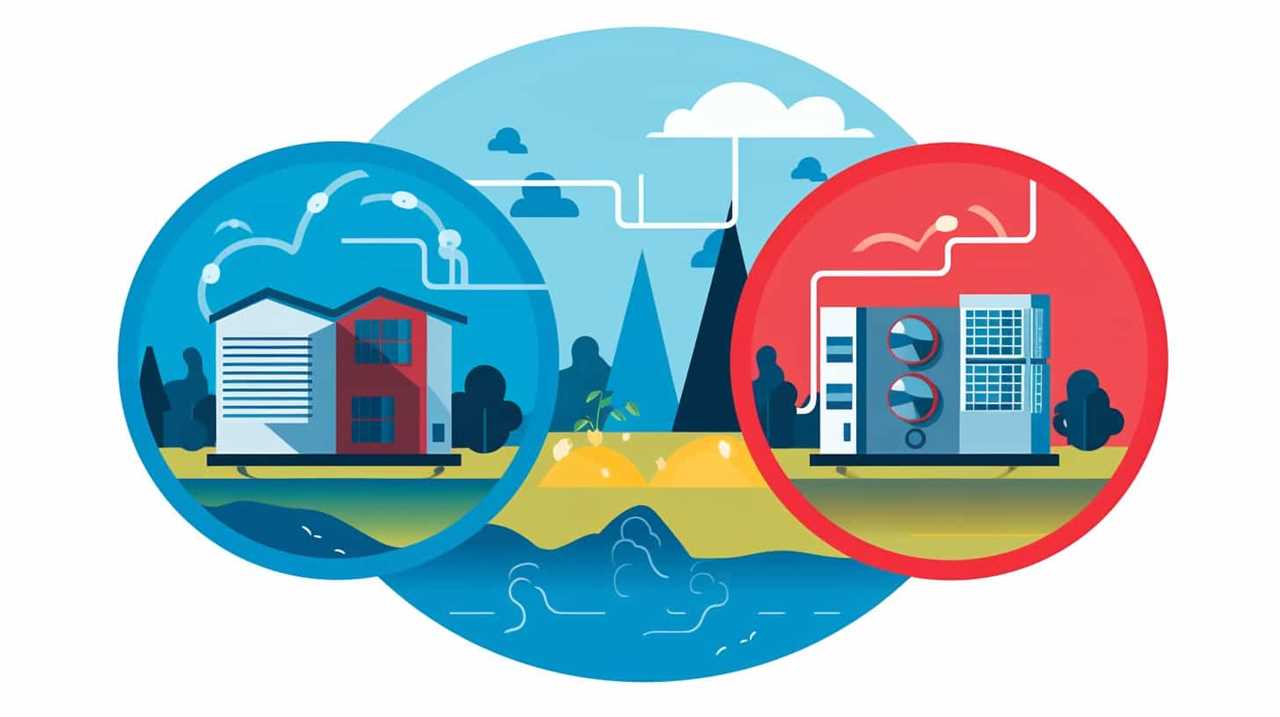
Maximizing Efficiency: Tips for Optimal Performance
To maximize the efficiency of a heat pump and ensure optimal performance, there are several key points to consider.
First, adjusting the temperature settings can greatly impact energy consumption.
Regular maintenance and cleaning are also essential to keep the heat pump running smoothly and efficiently.
Additionally, proper insulation and weatherstripping can help minimize heat loss and improve the overall energy efficiency of the system.
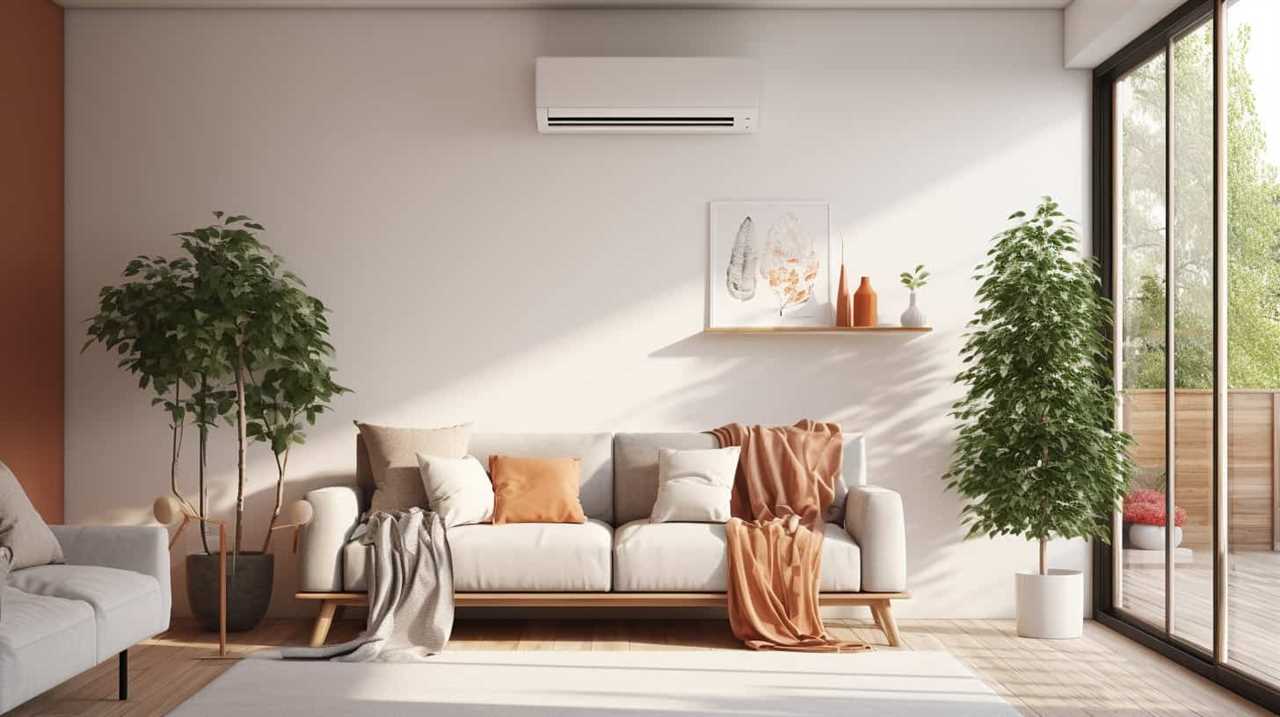
Temperature Settings for Efficiency
Adjusting temperature settings is crucial for maximizing the efficiency and performance of heat pumps. Proper temperature control is one of the most effective energy-saving strategies when it comes to home heating.
To achieve optimal efficiency, it’s recommended to set the thermostat to the lowest comfortable temperature during the winter months. This helps reduce the workload on the heat pump and prevents unnecessary energy consumption. Additionally, it’s important to avoid frequent adjustments to the temperature settings, as this can lead to inefficient operation and increased energy usage.
It’s also advisable to use programmable thermostats, which allow for precise temperature scheduling based on your daily routines. By following these temperature settings for efficiency, you can ensure that your heat pump operates at its best, saving energy and reducing your heating costs.
Regular Maintenance and Cleaning
We should regularly maintain and clean our heat pumps to maximize efficiency and ensure optimal performance. Here are some cleaning techniques that can help us achieve this:
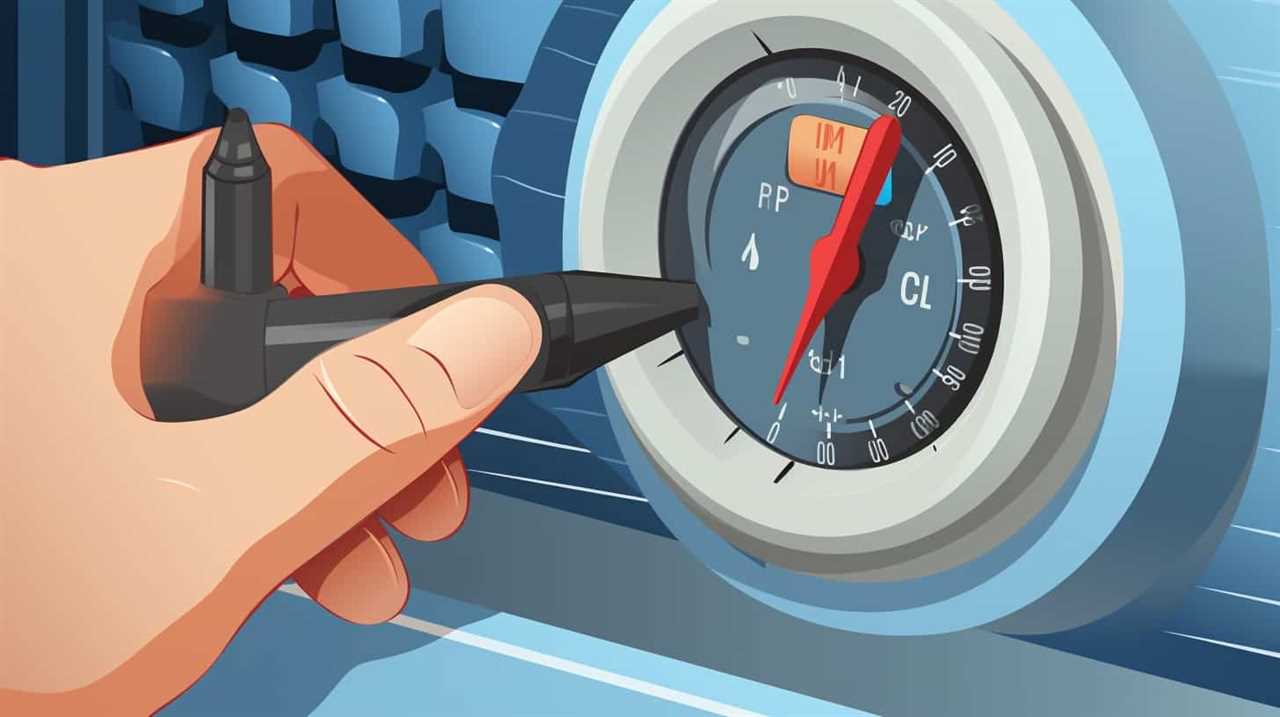
-
Clean or replace air filters: Regularly cleaning or replacing the air filters in our heat pumps is essential for maintaining airflow and preventing dust and debris buildup. Clogged filters can restrict airflow, reducing the system’s efficiency.
-
Clean the outdoor unit: The outdoor unit of our heat pump can accumulate dirt, leaves, and debris over time. Cleaning the unit regularly with a hose can help remove any obstructions that might hinder its performance.
-
Schedule professional maintenance: It’s advisable to have our heat pump professionally serviced at least once a year. A qualified technician can inspect and clean the internal components, identify any potential issues, and ensure that the system is running optimally.
Insulation and Weatherstripping
Our heat pumps can achieve optimal performance and maximize efficiency through proper insulation and weatherstripping.
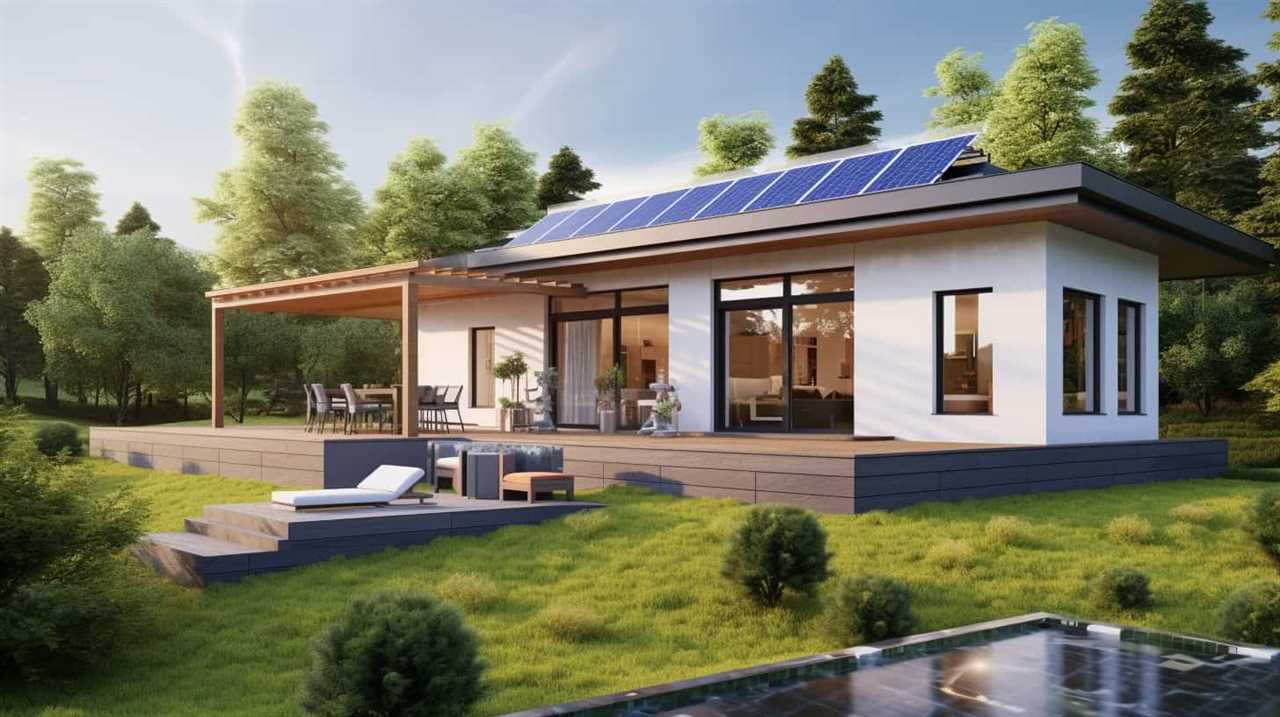
Insulation plays a crucial role in reducing heat loss and maintaining a comfortable indoor temperature. By insulating your home, you can reduce the amount of energy needed to heat it, resulting in lower energy bills and reduced environmental impact. Insulation benefits include improved energy efficiency, reduced heat loss, and increased comfort.
Weatherstripping techniques, on the other hand, focus on sealing gaps and cracks around doors and windows to prevent drafts and heat loss. This helps to maintain a consistent indoor temperature and reduce the workload on your heat pump. Weatherstripping benefits include improved energy efficiency, enhanced comfort, and reduced noise infiltration.
By combining proper insulation and weatherstripping techniques, you can maximize the efficiency of your heat pump and enjoy a more energy-efficient and comfortable home.
Now let’s move on to discuss the benefits of heat pumps for home heating.
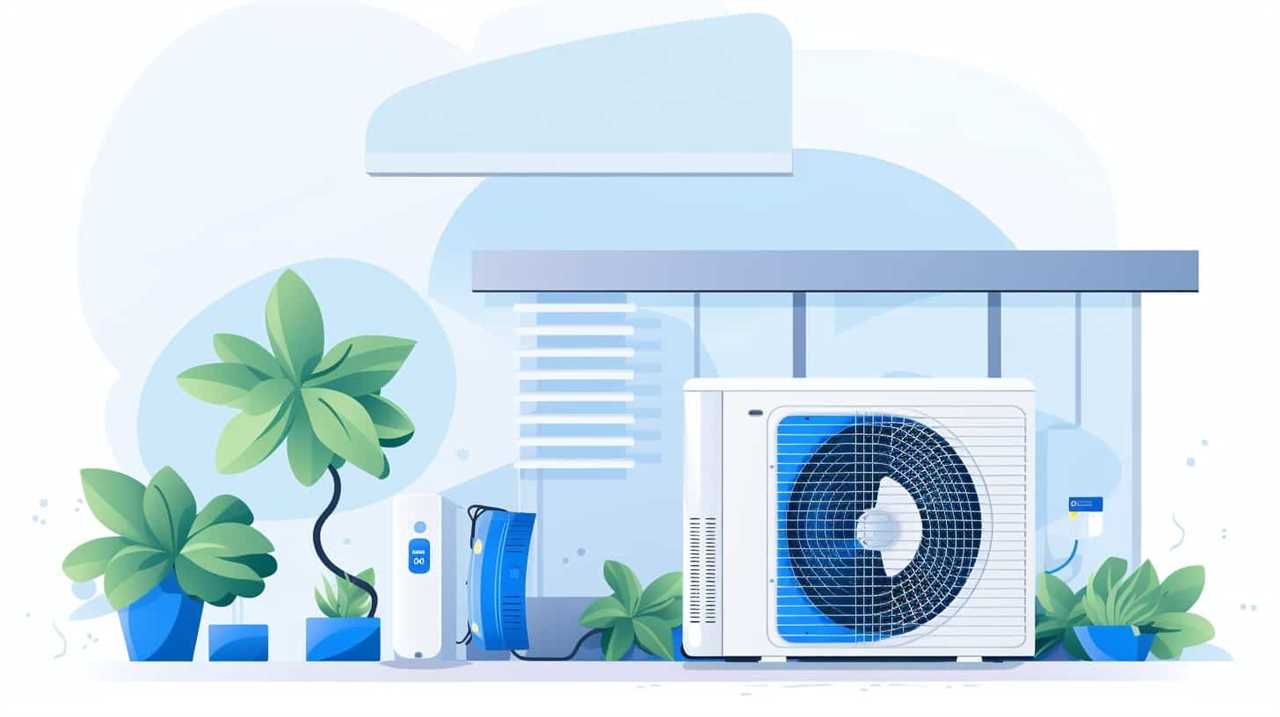
The Benefits of Heat Pumps for Home Heating
Heat pumps offer several benefits for home heating.
Firstly, they’re a cost-effective heating solution. By extracting heat from the air or ground, heat pumps can produce more energy than they consume, resulting in lower heating costs.
Additionally, heat pumps have a lower carbon footprint compared to traditional heating systems, contributing to a more sustainable and environmentally friendly home heating option.
Cost-Effective Heating Solution
Although heat pumps require an initial investment, they provide a cost-effective heating solution in the long run. Here are some benefits of heat pumps for home heating:
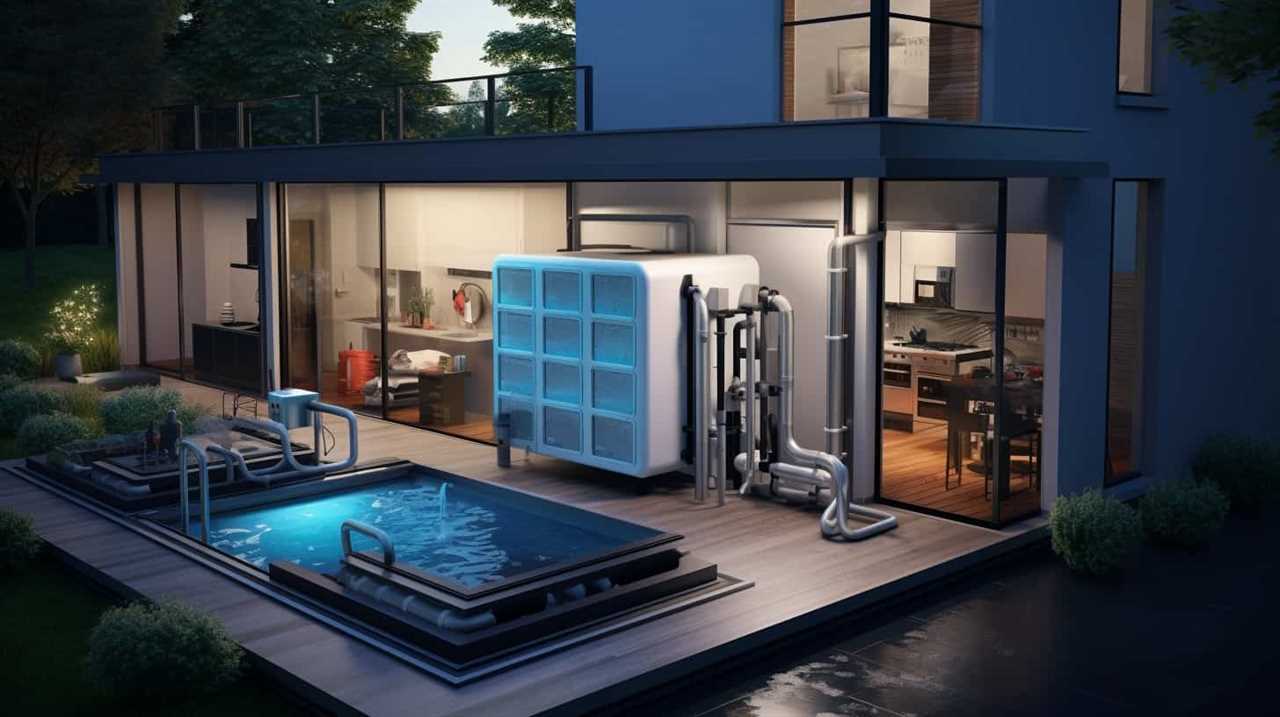
-
Energy saving tips: Heat pumps are highly energy-efficient, as they transfer heat from the outside air or ground to warm up your home. This process requires less energy compared to traditional heating methods, resulting in significant energy savings.
-
Long-term savings: While the upfront cost of installing a heat pump may be higher, it pays off in the long term. Heat pumps have lower operating costs and require less maintenance than other heating systems, leading to substantial savings on your energy bills over time.
-
Increased home value: Installing a heat pump can increase the value of your home. Potential buyers are often attracted to energy-efficient features that can help them save money in the long run.
Lower Carbon Footprint
Using heat pumps for home heating significantly reduces our environmental impact by lowering our carbon footprint. Heat pumps are sustainable heating options that work by extracting heat from the air, ground, or water, and transferring it into our homes. Unlike traditional heating systems that rely on burning fuel, heat pumps simply move heat from one place to another, making them highly energy-efficient.
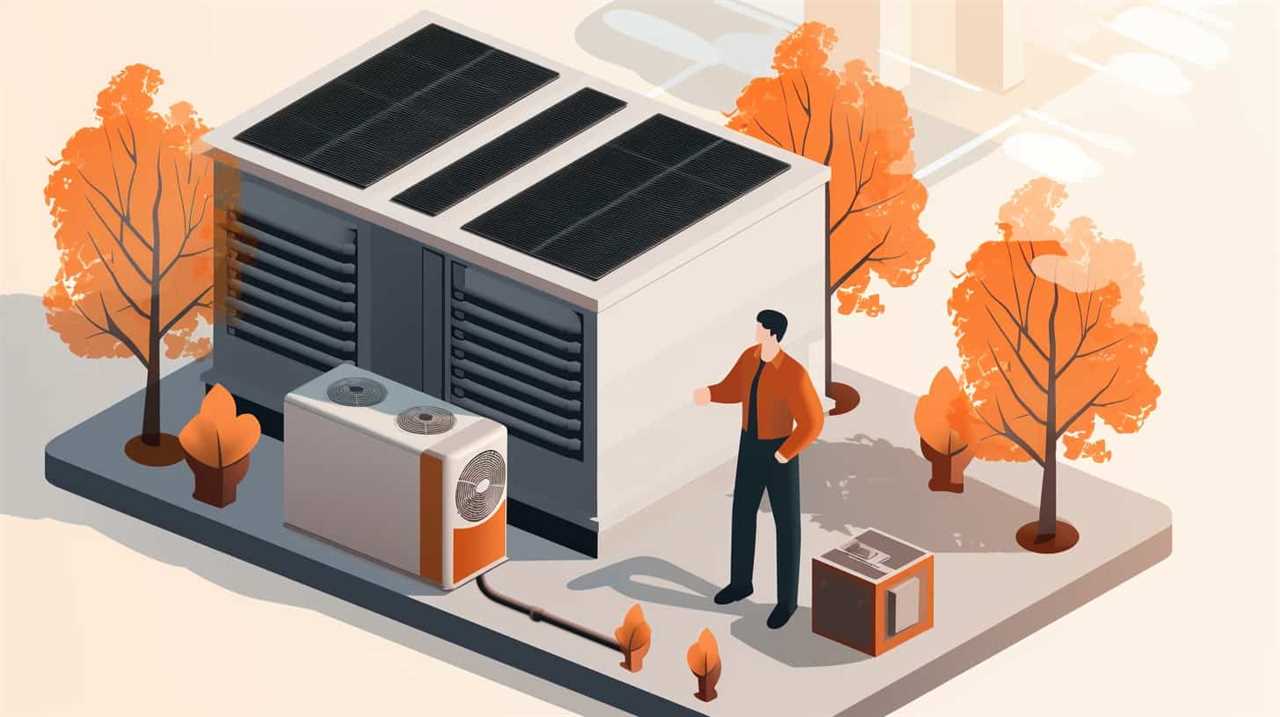
By reducing the amount of energy needed to heat our homes, heat pumps help in reducing environmental impact by minimizing greenhouse gas emissions. This not only benefits the environment but also contributes to the overall sustainability of our communities.
With heat pumps, we can enjoy a comfortable and warm home while actively making a positive difference in our environment.
Common Myths and Misconceptions About Heat Pumps
Let’s debunk some common myths and misconceptions about heat pumps.
-
Heat pumps aren’t efficient in cold climates: One of the biggest myths is that heat pumps don’t work well in cold climates. However, modern heat pumps are designed to operate efficiently even in low temperatures. They use advanced technology, such as dual-speed compressors and defrost cycles, to maintain heat pump efficiency even in extreme cold conditions.
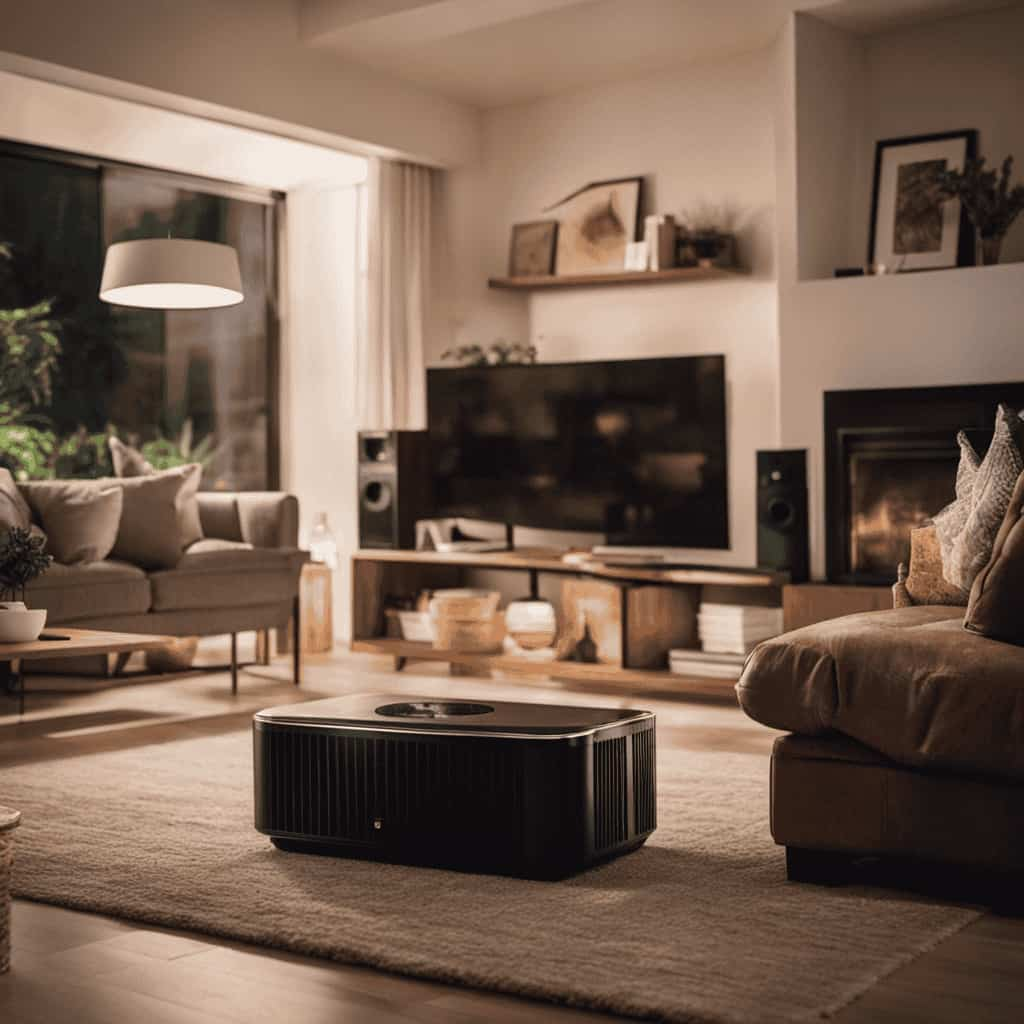
-
Heat pumps only provide heating: Another misconception is that heat pumps can only be used for heating. In reality, heat pumps are versatile systems that can both heat and cool your home. They use the same principle of transferring heat, but in reverse, to provide cooling during the summer months.
-
Heat pumps are noisy: Some people believe that heat pumps are noisy and disruptive. However, modern heat pumps are designed to operate quietly. With advanced sound insulation and variable-speed compressors, they can provide efficient heating and cooling without causing any disturbance.
Maintenance and Care: Keeping Your Heat Pump Running Smoothly
We should regularly clean and replace air filters to ensure our heat pump operates efficiently and smoothly. Clogged or dirty filters can restrict airflow, reducing the heat pump’s efficiency and increasing energy consumption. In addition to filter maintenance, there are other important steps to keep our heat pump running smoothly.
To help you with heat pump troubleshooting and common maintenance mistakes, here are some key points to keep in mind:
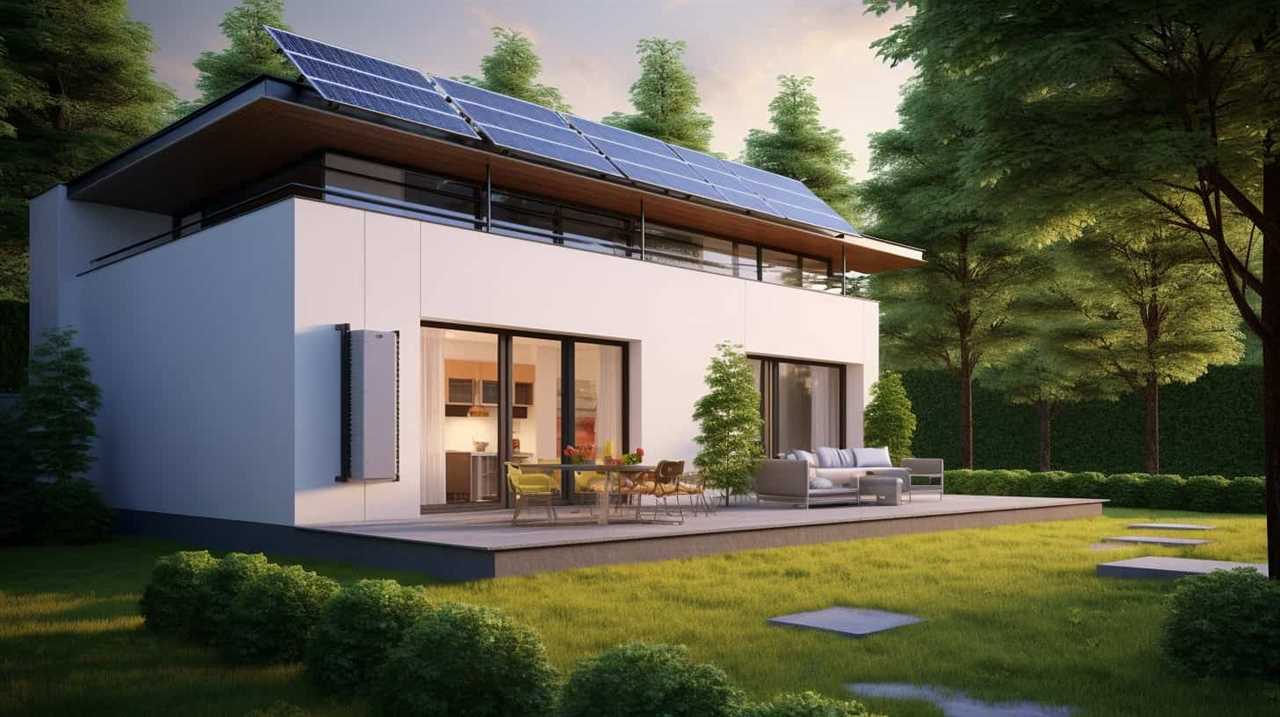
| Maintenance Task | Frequency | Purpose |
|---|---|---|
| Clean outdoor unit | Annually | Remove debris and dirt that can obstruct airflow and decrease efficiency. |
| Check refrigerant levels | Bi-annually | Ensure proper levels for optimal performance and efficiency. |
| Inspect electrical connections | Annually | Verify secure connections and prevent potential hazards. |
Energy-Saving Features and Technology in Heat Pumps
We can maximize energy efficiency in our homes by utilizing the various energy-saving features and technology available in heat pumps. These advanced technologies and energy-efficient designs help reduce energy consumption and lower utility bills.
Here are some key features and technologies to look for when considering a heat pump:
-
Variable Speed Compressors: These compressors adjust their speed to match the heating or cooling demand, resulting in more precise temperature control and increased energy efficiency.
-
Smart Thermostats: These thermostats can learn your heating preferences and adjust the temperature accordingly, saving energy by avoiding unnecessary heating or cooling.

-
Heat Recovery Ventilation: This technology allows the heat pump to recover and reuse heat from stale air, improving energy efficiency and indoor air quality.
Exploring Incentives and Rebates for Heat Pump Installation
To maximize savings on heat pump installation, it is important to explore the various incentives and rebates available. Many incentive programs are offered by governments, utility companies, and non-profit organizations to encourage the adoption of energy-efficient heating systems like heat pumps. These programs aim to provide financial savings to homeowners and promote sustainability.
Here is a table outlining some of the common incentive programs and rebates for heat pump installation:
| Program Name | Description | Eligibility | Financial Savings |
|---|---|---|---|
| Government Rebates | Government-funded programs that provide financial incentives for heat pump installation. | Varies by location | Up to 30% of installation cost |
| Utility Company Rebates | Rebates offered by utility companies to encourage energy-efficient home heating. | Customers of specific utility companies | Up to $500 or more |
| Non-profit Organization Incentives | Incentives provided by non-profit organizations to promote energy efficiency. | Homeowners who meet specific criteria | Varies by program |
Exploring these incentive programs can help homeowners offset the cost of heat pump installation and achieve significant financial savings. It is important to check with local authorities and utility companies to find out about the available incentives in your area.

Frequently Asked Questions
Are Heat Pumps Suitable for All Climates?
Heat pumps are generally suitable for all climates; however, their efficiency may vary in extreme conditions. Factors such as insulation, proper installation, and size of the heat pump can ensure optimal performance even in challenging weather conditions.
Can a Heat Pump Be Used for Both Heating and Cooling?
Yes, a heat pump can be used for both heating and cooling. It offers efficient temperature control by transferring heat between indoor and outdoor environments, making it an advantageous option for energy-conscious homeowners.
How Long Does a Heat Pump Last?
On average, a heat pump lasts for 15 to 20 years. However, signs of heat pump failure, such as reduced efficiency or strange noises, may indicate the need for repairs or replacement.
Do Heat Pumps Require Regular Maintenance?
Regular maintenance is necessary to ensure the energy efficiency of heat pumps. By keeping the system clean, checking for any issues, and performing routine tune-ups, we can maximize the performance and longevity of the heat pump.
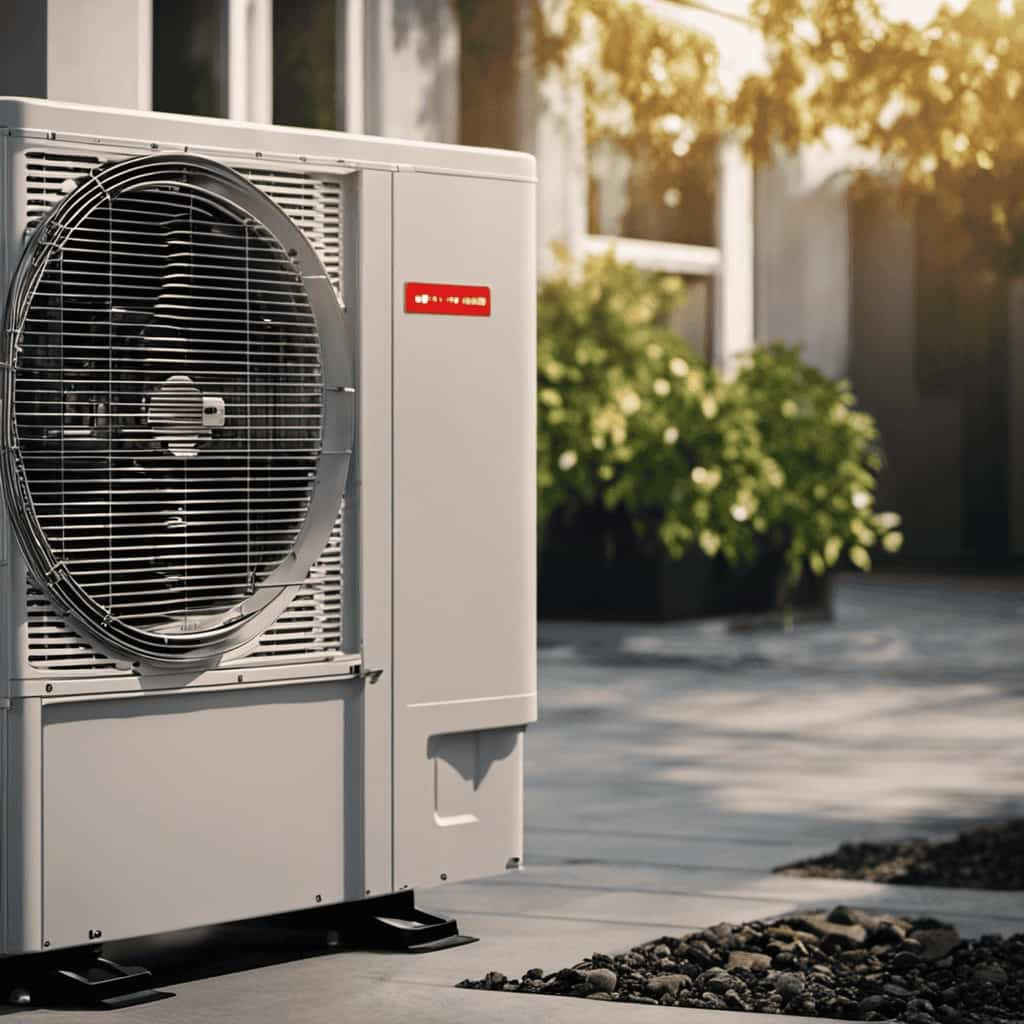
Are There Any Financial Incentives or Rebates Available for Installing a Heat Pump?
Financial benefits and government incentives are available for installing a heat pump. These incentives can help offset the initial cost of installation and make energy-efficient home heating more affordable and accessible to homeowners.
Conclusion
In conclusion, heat pumps offer a highly efficient and sustainable solution for home heating. By harnessing the power of the earth or air, these innovative systems provide optimal performance while reducing energy consumption.
Whether you choose to install a heat pump yourself or seek professional assistance, it’s crucial to select the right size and maximize efficiency through proper maintenance.
With the added benefits of energy-saving features and potential incentives, heat pumps are a smart choice for a comfortable and eco-friendly home.
